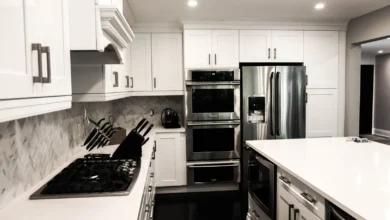How to Choose the Right Roofing Contractor: Insights from Industry Experts

Choosing the right roofing contractor is crucial for ensuring the quality, durability, and longevity of your roof. With so many contractors available, making the best choice can be challenging.
This article provides insights from industry experts on how to choose the right roofing contractor for your needs.
1. Assess Your Roofing Needs
Before you start looking for roofing experts, it’s essential to understand your specific roofing needs. Are you looking for a simple repair, a complete replacement, or perhaps an installation for new construction? Knowing the scope of the work will help you find a contractor with the right expertise.
1.1. Evaluate the Condition of Your Roof
Inspect your roof to determine its current condition. Look for signs of damage such as missing shingles, leaks, or sagging areas. This initial assessment will help you communicate your needs more effectively to potential contractors.
1.2. Determine the Type of Roofing Material
Consider the type of roofing material you prefer. Different contractors specialize in different materials, such as asphalt shingles, metal, tile, or slate. Knowing your material preference will narrow down your choices.
2. Research and Shortlist Potential Contractors
Once you have a clear understanding of your needs, start researching potential roofing contractors. Look for local companies with a good reputation and a solid track record.
2.1. Seek Recommendations
Ask friends, family, and neighbors for recommendations. Personal referrals are often reliable sources of information about the quality of work and customer service.
2.2. Read Online Reviews
Check online reviews on platforms like Google, Yelp, and the Better Business Bureau. Pay attention to both positive and negative reviews to get a balanced perspective.
2.3. Verify Credentials
Ensure that the contractors you shortlist are licensed, insured, and bonded. This protects you from potential liabilities and ensures that the contractor meets industry standards.
3. Evaluate Experience and Expertise
Experience is a crucial factor when choosing a roofing contractor. An experienced contractor is likely to deliver better quality work and handle unexpected challenges more effectively.
3.1. Check the Contractor’s Portfolio
Ask for a portfolio of previous projects. This will give you an idea of the contractor’s work quality and style. Look for projects similar to yours to gauge their experience with your specific needs.
3.2. Ask About Industry Certifications
Industry certifications from organizations such as the National Roofing Contractors Association (NRCA) or manufacturer certifications (e.g., GAF Master Elite) indicate a higher level of expertise and commitment to quality.
4. Request Detailed Quotes
Obtaining detailed quotes from multiple contractors is essential for comparing costs and understanding the scope of work. Be wary of quotes that seem too good to be true, as they may indicate subpar materials or workmanship.
4.1. Ensure Transparency
A good quote should include a breakdown of costs for materials, labor, and any additional fees. It should also outline the project timeline and payment schedule.
4.2. Compare Apples to Apples
When comparing quotes, ensure you are comparing similar services. For example, if one quote includes disposal fees and another does not, you need to account for those differences in your comparison.
5. Check References and Past Work
Before making your final decision, check the contractor’s references and inspect their past work. This step helps verify the quality of their work and their reliability.
5.1. Contact Previous Clients
Ask the contractor for a list of past clients you can contact. Speak to these clients about their experience with the contractor, including communication, workmanship, and adherence to timelines.
5.2. Inspect Completed Projects
If possible, visit some of the contractor’s completed projects. This will give you a firsthand look at their work quality and attention to detail.
6. Review the Contract Thoroughly
Before signing any agreement, review the contract thoroughly. Ensure that all details discussed are included in writing to avoid any misunderstandings later on.
6.1. Key Elements to Include
The contract should clearly outline the scope of work, materials to be used, project timeline, payment schedule, warranty information, and any other pertinent details.
6.2. Understand the Warranty
Ensure that you understand the warranty offered on both materials and labor. A good contractor should provide a warranty that covers potential issues after the project’s completion.
7. Communicate Clearly and Regularly
Effective communication is key to a successful roofing project. Maintain open lines of communication with your contractor throughout the project.
7.1. Set Expectations Early
Set clear expectations for communication frequency and methods. Regular updates on the project’s progress can help avoid misunderstandings and keep the project on track.
7.2. Address Issues Promptly
If any issues arise during the project, address them promptly with the contractor. Early intervention can prevent minor problems from becoming major issues.
8. Beware of Common Red Flags
Being aware of common red flags can help you avoid unreliable contractors.
8.1. Unusually Low Bids
Be cautious of contractors who offer significantly lower bids than others. This could indicate the use of inferior materials or a lack of experience.
8.2. Lack of Insurance
Ensure the contractor has adequate insurance coverage. This protects you from liability in case of accidents or damage during the project.
8.3. Pressure to Sign Quickly
Avoid contractors who pressure you to sign a contract quickly. Take your time to review all documents and make an informed decision.
Read also: What to Expect When Working with a Roof Repair Contractor
9. Finalize Your Decision
After thorough research, evaluations, and discussions, finalize your decision.
9.1. Trust Your Instincts
Trust your instincts when choosing a contractor. If something feels off, it’s worth reconsidering your choice.
9.2. Confirm All Details
Before the project begins, confirm all details with your contractor, including the start date, timeline, and any specific requirements.
10. Post-Project Follow-Up
After the project is completed, follow up with your contractor to ensure everything meets your expectations.
10.1. Conduct a Final Inspection
Conduct a final inspection of the work with your contractor. Address any issues or concerns before making the final payment.
10.2. Provide Feedback
Provide feedback on your experience. This can help the contractor improve their services and assist other homeowners in making informed decisions.
Conclusion
Choosing the right roofing contractor requires careful consideration and thorough research. By following the steps outlined in this article and leveraging insights from industry experts, you can make an informed decision that ensures the quality and longevity of your roof. Remember to assess your needs, research potential contractors, evaluate their experience, request detailed quotes, check references, review contracts thoroughly, communicate effectively, and be aware of common red flags. With these strategies, you can find a reliable roofing contractor who meets your specific needs and delivers excellent results.




